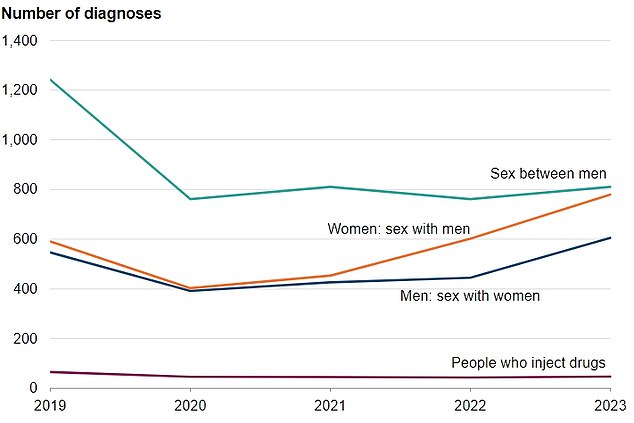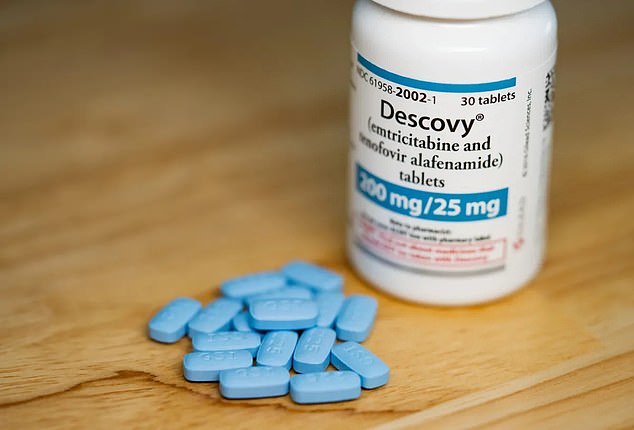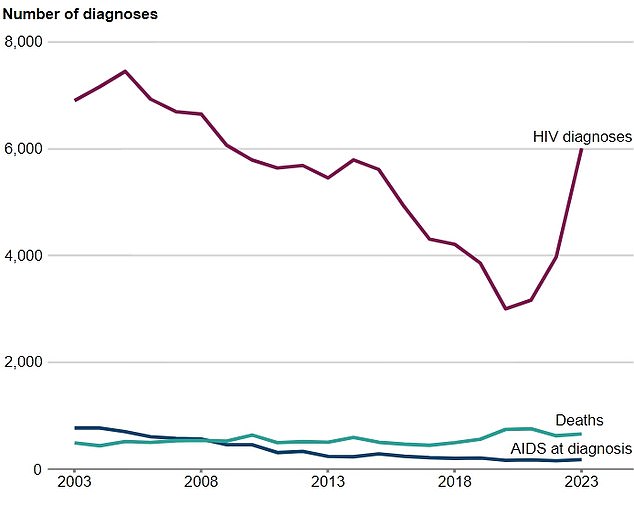Tens of thousands of HIV patients could soon to be offered a monthly pill to control the virus and keep the virus at bay.
Results from a landmark trial show the drug was as effective as the daily cocktail of pills patients currently take.
Experts claim the new pill, known as a nucleoside reverse transcriptase translocation inhibitor (NRTTI), could fulfill an ‘unmet need’ and replace the daily pills, improving compliance.
Developed by pharmaceutical giant Merck, it has been tested on animals and humans, with further studies currently being undertaken in the hope of preventing HIV in those at low risk of infection.
Charities estimate nearly 41 million adults and children across the world have HIV, including at least 113,000 in the UK.
According to the World Health Organization (WHO), it ranks alongside tuberculosis as the world’s most deadly infectious disease.
The lethal virus progressively damages the cells in the immune system, weakening the body’s ability to fight infections.
Left untreated, this leads to AIDS—the collective name for a series of deadly infections which the weakened immune system cannot tackle.

A monthly pill could be introduced to tackle the ongoing HIV epidemic, with officials looking to end transmissions in England by 2030 with better prevention, testing and treatment

Heterosexual men had the biggest increase in new HIV diagnoses according to latest figures, with over 600 cases in 2023, a rise of 36 per cent. Source: UKHSA
Currently pre-exposure prophylaxis—or PrEP—is a vital part of reducing the number of new HIV infections which has been proved to protect people from HIV.
But for the once-daily pills to work, they have to be taken meticulously.
Other options also include a twice-yearly injection—which was approved in the US in June—or a jab administered every eight weeks by a healthcare professional.
In the new monthly pill, meanwhile, works by inhibiting the virus from replicating, by blocking a key step in the mutation process along the DNA chain.
Writing in the journal Plos Biology, the researchers said the monthly pill ‘could provide a convenient option with the potential to improve adherence compared to daily PrEP’.
It could also provide a solution for patients who currently cannot access healthcare setting for long-acting, injectable PrEP, they added.
In June, the WHO acknowledged that while a twice-yearly injectable treatment was a ‘transformative step forward’ in protecting people at risk of HIV, there was still a long way to go.
According to the latest figures, approximately 630,000 people died from HIV-related causes globally last year.

Descovy is a drug currently used as part of PrEP therapy to treat and prevent HIV infection in adults and teenagers. It is typically prescribed alongside other medications

When people who already had HIV, previously diagnosed elsewhere in the world, were included the total ‘new’ cases recorded in England in 2023 rose to 6,008
The virus attacks the immune system and weakens the body’s ability to fight everyday infections and disease.
Its spread through bodily fluids—such as semen, vaginal blood and breast milk—of an infected person. However, it cannot be spread through sweat, saliva or urine.
It is most commonly spread through having unprotected anal or vaginal sex—when a barrier method which such as a condom is not used.
Tests available from GPs, sexual health clinics and online are the only way to detect HIV which involve taking a saliva or blood sample.
Currently, PrEP can only be prescribed to over-16s.
Those who take post-exposure prophylaxis (PEP)—an anti-HIV medicine—within 72 hours of exposure may avoid becoming infected at all.
For those who are infected, there is currently no cure.











